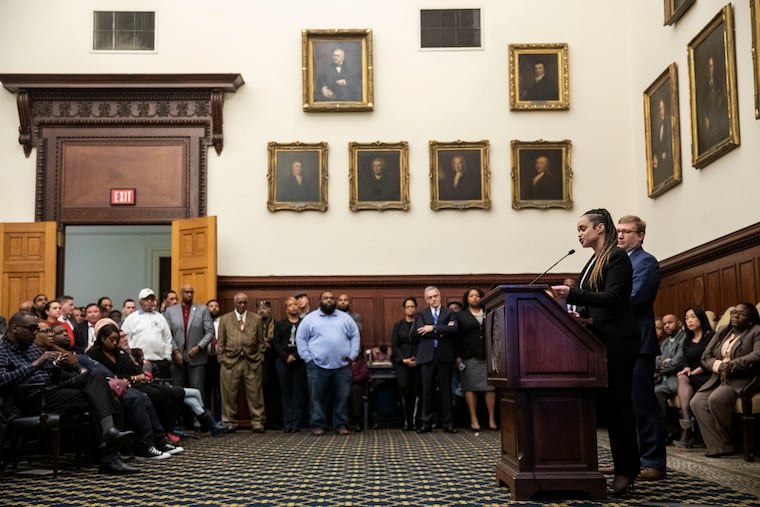First up for Philly police commissioner Danielle Outlaw: Actually stopping crime | Opinion
The City needs to focus on the right issues when we talk about her future here.

Philadelphia’s incoming police commissioner, Danielle Outlaw, was welcomed to the city of brotherly love with glowing anticipation from the media.
Outlets including The Inquirer, Billy Penn, and CNN cooed that Outlaw will be the first woman of color to serve as Philadelphia’s top brass. Coverage focused on her being a black woman and Philadelphia’s supposedly “scandal-plagued” police force. Many articles ignored or buried the surging murder rate in our city — Billy Penn and CNN’s first reports didn’t even bother to mention it. Apparently the police chief exists solely to affirm the progressive ideal of what an officer should look like, rather than focus on the need to fight crime on behalf of vulnerable Philadelphians.
This ignorance of Outlaw’s key mandate — preventing violent crime that victimizes residents across the city, especially neighborhoods like Fairhill, Kensington, and Southwest — tells you everything you need to know about the progressive media class and their disconnect with reality.
Most of today’s rhetoric on violent crime exists in a different world from the people experiencing it as a daily phenomenon.
Put another way, if you are more concerned about how a police chief looks than the city’s murder rate, it is likely that you’ve never had to rely on the police to respond in a moment of extreme danger.
So, what is Outlaw’s record, and why does it matter for Philadelphia?
Well, since 2017 when she began leading Portland’s police force, the small city in the Pacific Northwest has continued to be rocked by “antifascist” mobs including protesters willing to maim anybody to the political right of Joseph Stalin. The police force has been accused of inaction two years after Politico dubbed Portland “America’s most politically violent city.” Though that title predates Outlaw, Portland’s lasting political strife is not exactly an auspicious sign for Philadelphia.
» READ MORE: New Year’s Eve homicides make 2019 the worst for killings in Philly since 2007
Outlaw arrives to a city in dire need of better policing. Our murder rate has risen sharply after decades of decline. In 2019, Philadelphia’s residents experienced the most shootings in over a decade (narrowly beating 2018, itself a record year), and our deadliest year since 2007. The murder rate is over 40% higher than it was in 2013, an astounding figure that garners scant attention compared to the plaudits on officer identity and constant refrain that police are a corrupt, racist occupying force in Philadelphia’s neighborhoods.
While progressive types may defend reforms coming from City Hall and the district attorney, the rising number of children being buried in our city can ill-afford more of the same.
All this doesn’t doom Outlaw’s tenure. Her record points to a seasoned and respectable cop who, like most police officers, wants to see the people of Philadelphia protected and our crime levels go down.
» READ MORE: Philadelphia’s new police chief Danielle Outlaw doesn’t have a bob. Here’s why that’s awesome. | Elizabeth Wellington
But it does mean we need to focus on the right issues when we talk about her future here.
Outlaw can start in Philadelphia by pursuing a higher clearance rate — rate of cases solved — for homicides and other violent crime, and by incarcerating those who sling drugs and weapons through communities and endanger everybody around them.
Outlaw may focus especially on building lines of communication between the police and communities who may distrust them, and who instead of going to the cops pursue their own street justice — leading to ever-escalating cycles of violence.
Outlaw can also serve as a strong voice for our police, not against them. She can speak out against inane and counterproductive stances like abolishing the police entirely — an absurd position highlighted in The Inquirer last week, where an argument for abolition concluded that people facing down murderers should “rely on family, friends, and neighbors instead of calling the cops.”
Once again: It must be nice to never have to call the police, while residents who live in fear of violent crime need them for protection.
What our city is facing is a murder epidemic. Chief Outlaw’s work will be to bring it down.
Anybody demanding less from Outlaw, and the rest of our law enforcement and ruling class, is likely more concerned with affirming their own political biases than stopping the crime that victimizes so many.
It’s a privilege they can afford to live with, but many Philadelphians cannot.
Albert Eisenberg is a Philadelphia-based political consultant. He formerly served as the communications director for the Philadelphia Republican Party, and is a founder of Broad + Liberty. @albydelphia